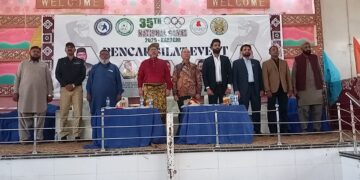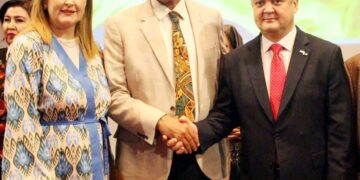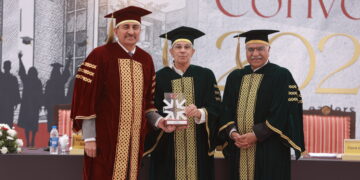Pakistani business community Sunday urged the OIC to further strengthen and promote intra trade among member countries to offset looming global threat of pandemic affects on their economies.
Chairing a round table conference on “OIC Trade Prospects” here in city organised by Meher Kashif Younis,former senior Vice President Lahore Chamber,President SAARC Chamber of Commerce and Industry Iftikhar Ali Malik said OIC is the second largest inter-governmental Orgnisation after United Nations with a large membership of 57 states covering four continents whereas it’s intra trade between 2019-20 registered a decrease of 21.2 percent ranging from US$700.1 bn and US$522.8 bn in 2019.
He pointed out that during covid 19,the world economy has witnessed an unprecedented turbulence that impacted different crucial sectors in which several countries are recovering gradually with slow pace but not at the same level everywhere. He said whole of OIC is blessed with huge natural resources and minerals deposits but their share in global economy and even within member countries is not upto inherited potentials.
Iftikhar Ali Malik said trade facilitation activities are of great importance to promote intra?OIC trade and investment. He said the majority of tariff barriers relate to sanitary and phytosanitary measures, which constitute a burden for exporters. Non?tariff measures affect more than 50% of companies in member states especially technical measures and measures related to procedures.
Speaking on the occasion Meher Kashif Younis,the conference host said to gradually lower these obstacles, member states and OIC Institutions need to focus more on Trade Facilitation activities, i.e. training on rules of origin, product certification, mutual recognition of standards, establishment of commercial single windows, modernization of Customs administrations, sharing of successful experiences ,improvement of the services of Trade and Investment Promotion Organs and organization of intra?OIC trade and investment promotion programs.
He said OIC member states have signed several bilateral, regional and multilateral trade and investment agreements in order to better regulate trade and investment flows and further liberalize international trade transactions with local incentives.
Meher Kashif Younis said that states apply more restrictive domestic measures to companies than those encountered with commercial partners.He said indeed , the most important measures applied by member states are: import tariffs, financial subsidies, export subsidies, export tariffs, non?tariff import measures, import licensing, safeguard measures, anti?dumping measures, non?tariff export measures, import quotas, local content, financial incentives for FDI, export licensing, internal import taxes, import bans and export quotas.
Shahid Nazir,member executive committee Lahore chamber sharing his his experience said despite these barriers, member states have also initiated trade facilitation measures to streamline foreign trade transaction procedures such as the establishment of singles windows, the construction of road, rail and airport infrastructure, and the automation of customs administration, the exchange of electronic data inter?agency stakeholders of trade and the elimination of several foreign trade documents.
He said In order to better develop intra?OIC trade, it is appropriate for member states to activate the operationalization of the OIC trade preferential system either through the normal or fast?track way taking into account the evolution of the environment of regional trade agreements and to increase the organization of trade and investment promotion activities in order to develop the markets for products and services in these countries.
On the other hand, the countries that have not signed or ratified yet the TPS?OIC should do so as soon as possible, and move to the stage of its implementation,Shahid Nazir concluded
Rehmat Ullah Javed,an internationally acclaimed SME expert,two research scholars from School of Communication Studies Punjab University Muhammad Umer Ibrahim ,Ms Humna Rathore and others also addressed.



















